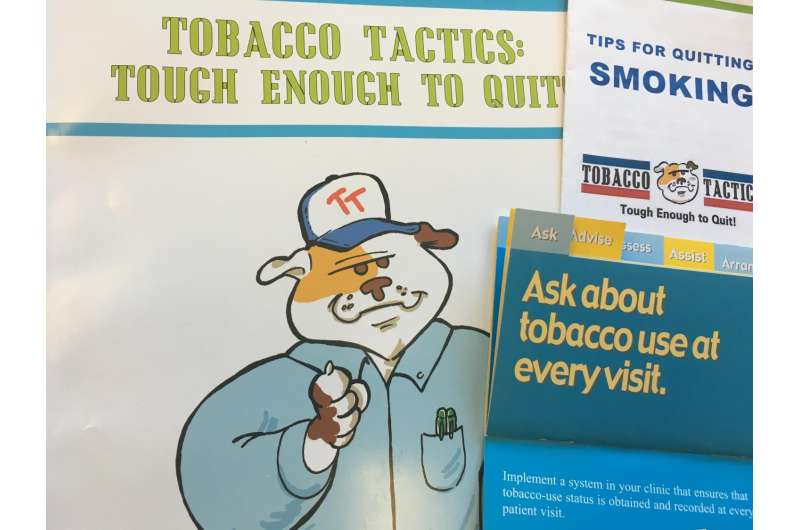A talk with a nurse can persuade hospital patients to quit smoking

A short talk with a knowledgeable nurse could be the difference between a smoker stopping for cigarettes or stopping for nicotine gum on her way home from the hospital.
New research shows that self-reported quit rates among hospital patients more than doubled when nurses and other staff were trained to coach patients on how to stop smoking and to make sure they got the help they needed to make it happen, whether that meant counseling, patches, gum or prescription medication.
"They were armed with everything they needed when they left - medication, behavioral tactics, a manual to help them stay on track," said Sonia Duffy, a professor of nursing at The Ohio State University and lead author of the study, which appears in the American Journal of Preventive Medicine.
"Hospitalization is the perfect time to help people quit. They're more motivated and nurses can explain how smoking harms their health, including slowing healing," said Duffy, who also works for the Department of Veterans Affairs Ann Arbor Healthcare System.
The study of 1,528 patients in five community hospitals in Michigan looked at self-reported and lab-confirmed quit rates six months after discharge. Those who'd been treated at three of the hospitals met at least once, but perhaps more, with a nurse who'd undergone a one-hour training on how to help people quit smoking.
Six months after release, 16.5 percent of the smokers from the intervention hospitals said they'd quit, compared to 5.7 percent from the other hospitals. The researchers also looked at lab-confirmed quit rates based on urine tests and found a two-fold difference among patients from intervention hospitals, but that data was not considered statistically significant.
Smoking cessation techniques are not routinely taught in nursing schools and counseling on quitting smoking is spotty in U.S. hospitals, Duffy said.
Those smokers who do get counseling don't always hear about it from a nurse and are often referred to the Tobacco Quit Line, which can be effective but is most frequently used by those who are already highly motivated, Duffy said.
Many smokers, even those who plan to quit, pick smoking right back up the minute they leave the hospital, she said. Getting them started with a quitting plan and tools while they're admitted boosts their chances of success, Duffy said.
"I hope hospital administrators will look beyond telephone quit lines to help people. They work for a select group of people and the rest are falling through the cracks. We have to use a multitude of different approaches to reach people," she said.
"Nurses have the greatest access to patients, they have relationships with patients and they can relate the benefits of quitting to the patient's medical condition."
The program, called "Tobacco Tactics," was designed to meet the standards of the Joint Commission, an independent nonprofit organization that accredits U.S. hospitals. The smoking cessation standards are currently voluntary, but are expected to become mandatory, Duffy said.
The nurse-patient interactions at the Tobacco Tactics hospitals lasted about nine minutes on average, Duffy said. At the other two hospitals, nurses and other staff didn't change their normal approach to caring for patients.
If smokers in Tobacco Tactics hospitals agreed to try, the nurse worked with a doctor to make sure they had whatever tools were best-suited to their addiction. In many cases, that means nicotine replacement therapy. In other cases, smokers quit with the help of an antidepressant or Chantix, a prescription smoking-cessation medication.
Nurses and other staff who went through Tobacco Tactics training were taught strategies that help smokers quit, including identifying triggers and planning strategies to manage cravings (munching on carrots, brushing teeth or going for a walk, for instance.)
Nurses carried a pocket card with reminders on how to help smokers. They learned which quit-smoking aids, including pharmaceutical drugs, were likely to help which type of smoker based on their addiction and past attempts at kicking the habit.
They also supplied patients with brochure on quitting, at minimum. Those who expressed interest could watch a 20-minute DVD or read the Tobacco Tactics manual, an easy-to-read magazine with information about tobacco and health and tips on quitting. They also received a card with the 1-800-QUIT-NOW Tobacco Quit Line number. Physicians in the hospitals were reminded to give patients brief advice to quit.
After they left the hospital, volunteers called them five times in the first month to check in and offer support.
Quit rates in the Tobacco Tactics hospitals and in the control hospitals were slightly lower than quit rates seen in other similar studies. That could be because this study used "real world bedside nurses" and not research nurses whose only job is to do smoking cessation, Duffy said. Her work also was different than much of the previous hospital intervention research because this study included smokers who were in the hospital for all kinds of reasons - not a select group, such as heart patients.

















